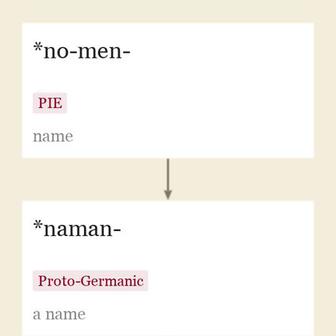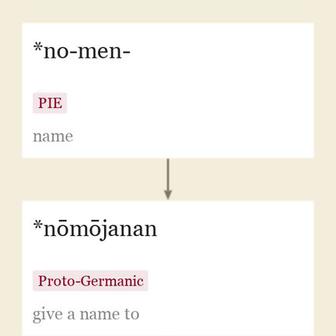"word by which a person or thing is denoted," Old English nama, noma "name, reputation," from Proto-Germanic *naman- (source also of Old Saxon namo, Old Frisian nama, Old High German namo, German Name, Middle Dutch name, Dutch naam, Old Norse nafn, Gothic namo "name"), from PIE root *no-men- "name."
The meaning "a famous person" is from 1610s (man of name "man of distinction" is from c. 1400). The sense of "one's reputation, that which is commonly said of a person" is from c. 1300. As a modifier meaning "well-known," it is attested by 1938.
In the name of "in behalf of, by authority of," used in invocations, etc., is by late 14c. Name-day "the day sacred to the saint whose name a person bears" is by 1721. Name brand "product made by a well-known company" is from 1944. Name-dropper "person who seeks to impress others by mentioning well-known persons in a familiar way" is by 1947. Name-child, one named out of regard for another, is attested by 1830. The name of the game "the essential thing or quality" is from 1966; to have one's name in lights "be a famous performer" is by 1908.
"I don't realize yet how fortunate I am. It seems that I have been dreaming. When I see my name in lights in front of the theatre, I think, 'No. It isn't I.' " [Billie Burke interview in "The Theatre Magazine," Nov. 1908]
Old English namian "to bestow a particular name upon, call, mention by name; nominate, appoint," from Proto-Germanic *nōmōjanan (source also of Old Saxon namon, Old Frisian nomia "to name, call," Middle Dutch noemen, namen), from the source of name (n.). Related: Named; naming.
"the use of opprobrious epithets," 1846, from call (someone or something) names "attempt to put someone or something in a bad light by affixing to him or it a word of unpleasant connotation" (1590s); see call (v.) + name (n.).
WHEN dunces call us fools without proving us to be so, our best retort is to prove them to be fools without condescending to call them so. [The Rev. C.C. Colton, "Lacon: or Many Things in Few Words," London, 1823]
"portion of a personal name between the given name and the surname," 1815, from middle (adj.) + name (n.). As "one's outstanding characteristic," colloquial, from 1911, American English.
According to Mr. H.A. Hamilton, in his "Quarter Sessions from Queen Elizabeth," the practice of giving children two Christian names was unknown in England before the period of the Stuarts, was rarely adopted down to the time of the Revolution, and never became common until after the Hanoverian family was seated on the throne. "In looking through so many volumes of county records," he says, "I have, of course, seen many thousands and tens of thousands of proper names, belonging to men of all ranks and degrees,—to noblemen, justices, jurymen, witnesses, sureties, innkeepers, hawkers, paupers, vagrants, criminals, and others,—and in no single instance, down to the end of the reign of Anne, have I noticed any person bearing more than one Christian name ...." [Walsh]


